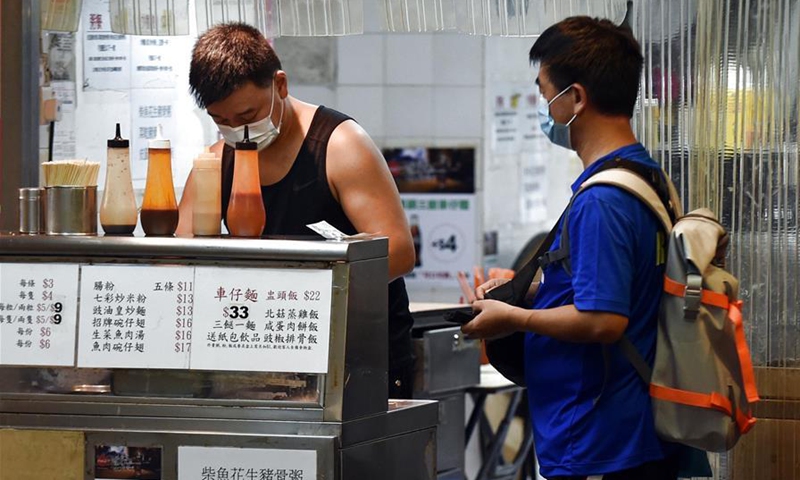Experts urge HK residents to be tested for COVID-19 amid community transmissions
By Huang Lanlan and Zhang Han Source: Global Times Published: 2020/8/14 19:18:40

A man buys food at a restaurant in Hong Kong, south China, July 29, 2020. Stricter social distancing measures took effect in Hong Kong on Wednesday. Dining-in services in restaurants are prohibited. (Xinhua/Lo Ping Fai)
Given fluctuating daily numbers of coronavirus cases and a rising death toll in Hong Kong, experts on Friday encouraged more residents to undergo free nucleic acid testing and said key groups should be tested repeatedly to identify silent carriers and cut community transmissions.
Hong Kong on Friday reported 48 new COVID-19 cases. That was a drop from the previous day's 69 infections, 28 of which were from unclear sources, indicating a severe undetected community transmission situation. Case numbers have been fluctuating in Hong Kong, hitting 33 on Tuesday, the lowest number in the past month, but surging back to more than 60 the following two days.
An alarming signal is the rising death toll, which was five on June 20 but increased to 66 on Friday. A nursing home in Tuen Mun alone recorded 10 deaths, local Hong Kong media reported.
Virus experts on Friday said the city should expand its testing scale to identify virus carriers, otherwise the contagion cannot be checked in communities even if border controls are tightened. Social distancing may slow down community infections to some extent, but without quarantine measures for all cases, numbers could explode again, analysts said.
Wang Guangfa, a respiratory expert at Peking University First Hospital, told the Global Times that a patient infects two to six people on average during the incubation period and after showing symptoms. Testing will help detect silent carriers and infections in the incubation period so that they can be treated in a timely manner.
Wang also noted that the city should test key groups related to international travel repeatedly as their health situations may change.
Echoing Wang, Wuhan-based virologist Yang Zhanqiu said the situation in Hong Kong is complex as international travelers could bring different sub-types of the virus to the city.
Yang suggested enhancing epidemiological investigations and the monitoring of patients and close contacts to effectively contain the further spread of the virus. "If that is achieved, the situation may ease in the city in two to three weeks," Yang said.
Hong Kong resident Cheung Ka-yan, 27, said she was looking forward to receiving a test. "It would be terrible if asymptomatic carriers were to walk around and spread the virus unconsciously to others," Cheung told the Global Times on Friday, saying there have been sporadic cases reported near her workplace in the Wan Chai district.
The free tests will help relieve residents' financial burdens, especially those from low-income households, and full-coverage testing will protect everyone in the city, Cheung said. Nucleic acid tests for COVID-19 in Hong Kong clinics and hospitals vary in cost from nearly HK$1,000 ($129) to HK$3,000, according to Cheung.
But some residents may still hesitate to be tested due to rumors spread by opposition forces including high-profile secessionist Joshua Wong, who claimed the central government's supporting team is collecting the DNA of Hong Kong residents and transferring it to the Chinese mainland.
The Hong Kong Special Administration Region (HKSAR) government late on Thursday again slammed these rumors, saying the samples will be tested only in Hong Kong and destroyed afterward. Samples and personal information are registered separately, which means lab personnel do not know to whom a sample belongs, according to HKSAR authorities.
Politicizing COVID-19 control work risks the lives of the Hong Kong people, and if residents do not cooperate, the city is in great danger of the outbreak spreading beyond control, analysts said.
RELATED ARTICLES:
Posted in: SOCIETY